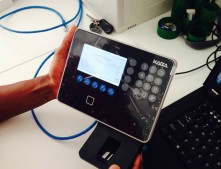Kaba’s B-eco data collection terminal ushers in new era in commercial time & attendance

The release of the Kaba B-eco data universal data collection terminal has opened up commercial time & attendance and represents a new phase of development of the market. Today, robust and cost-effective solutions are available to both large and smaller businesses.
Kaba is a leading global manufacturer of products for Enterprise Data Collection (EDC). It is focused on the collection and processing of all safety- and time-relevant company data for measuring, visualizing and optimizing targets and risks of the company.
The latest terminal, now available to the domestic and regional market via the Company’s local distribution partner, AWM360 Data Systems, features the functionality to add immediate value to workstations at entry level.
It guarantees timely and reliable business data collection with minimum effort and maximum saving potential.
Key features include: –
• Offline memory for up to 5.000 people and 20.000 offline bookings
• Easy operation through a robust touch-keypad, 15 freely configurable functions selection and a clearly readable graphic display
• Comprehensive functionality through an integrated RFID or biometric reader, two different software variants, freely configurable data recording sequences/display texts, and language selection
• External barcode scanner interface for easy capturing of order data
• Easy installation
Guenter Nerlich, Managing Director, AWM360 Data Systems, says the features and functionality of the terminal means that it offers immediate value to application in key areas of retail, manufacture and operation – in particular for smaller sized businesses.
For example, the shop floor data connection and the Kaba B-eco data terminal links up B-eco biometrics to accurately measure job time.
The value proposition is because the solution is positioned as a entry level T&A and SFDC (Shop Floor Data Collection) terminal, it is versatile and able to facilitate both biometric and RFID (Radio Frequency Identification) technology.
“Traditionally, biometric based access control and data collection has been the domain of the high-end of the market. That has now changed and smaller producers and operators are able to compete at the same level as their larger counterparts,” Nerlich explains.
